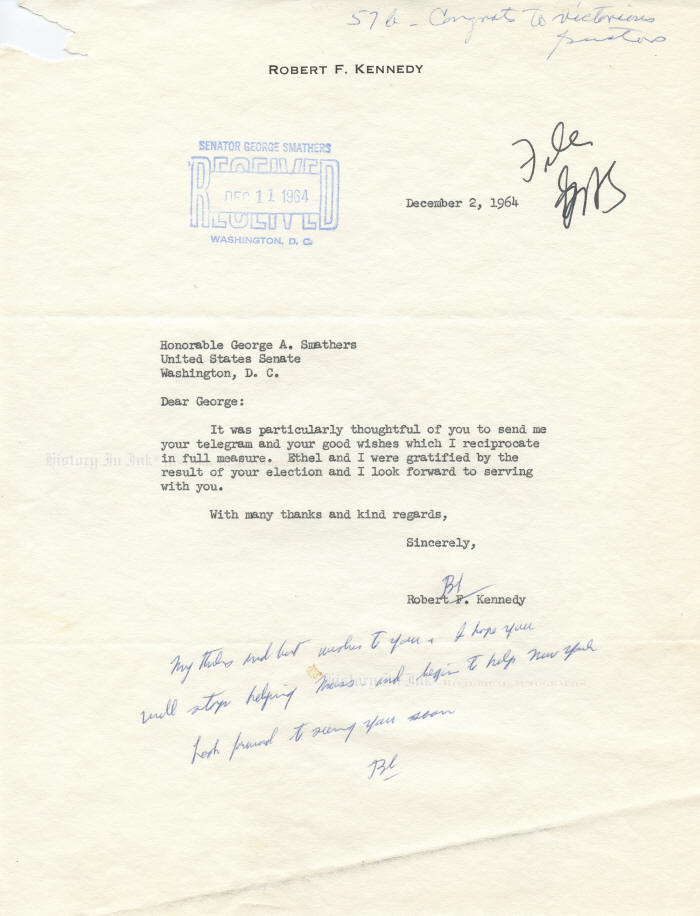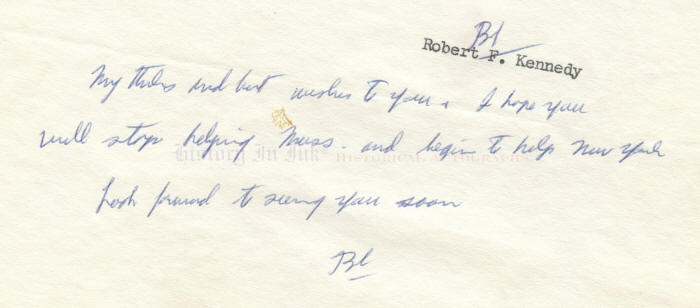

1734701
Robert F. Kennedy
“I hope you will stop helping Mass. and begin to help New York”
Robert Francis Kennedy, 1925–1968. Attorney General of the United States, 1961–1964; United States Senator from New York, 1965–1968. Typed Letter Signed, Bob, with three-line autograph postscript signed, Bob, one page, 8½” x 11”, on personal stationery, [no place], December 2, 1964. With Autograph Note Signed by Senator George A. Smathers, 1913–2007, GAS.
This is a wonderful letter that has never been offered on the autograph market before. Fresh off the November election victory that sent him to the United States Senate, Kennedy writes to thank Florida Senator George Smathers, a long-time Kennedy friend, for his congratulatory telegram. He writes, in full: “It was particularly thoughtful of you to send me your telegram and your good wishes which I reciprocate in full measure. Ethel and I were gratified by the result of your election and I look forward to serving with you.” In a handwritten postscript, he adds: “Many thanks and best wishes to you. I hope you will stop helping Mass. and begin to help New York[.] Look forward to seeing you soon[.]”
Kennedyʼs election to the Senate from New York was controversial. The Kennedy family compound was located at Hyannis Port, Massachusetts, and President John F. Kennedy prominently represented Massachusetts in Congress and in the Senate before he was elected President. Robert Kennedy served as Attorney General in his brotherʼs administration and remained following his brother’s assassination until he resigned to run for the Senate from New York in 1964. He announced his candidacy on August 22, 1964, two days before the Democratic national convention, and withdrew as a member of the Massachusetts delegation the next day. He established official New York residency only at the beginning of October and therefore could not even vote for himself on election day.
Thus, Kennedyʼs opponent, incumbent first-term Republican Senator Kenneth Keating, labeled Kennedy a carpetbagger. Respected publications such as Time magazine echoed the carpetbagger charge. Kennedy answered it in televised remarks on October 20, 1964:
Well, and let me say first, number one, I spent more time in the state of New York than any other state by far. I’ve—the first 20 years of my life were, was here in the state of New York. I might say that my brother ran for Congress in Massachusetts in 1946, and he—the major campaign issue against him was that he was a carpetbagger. I’ve—I lived in the state of New York for a far longer period of time than he lived in Massachusetts, interestingly enough, before he ran for Congress, and even I’ve lived in New York for a longer period of time than my brother lived in Massachusetts when he ran for the United States Senate which was three terms after he’d been in Congress. I’ve lived in New York for that period of time, so I have that relationship. My family has had a home here since 1925, the year I was born. Our major place of business has been in the state of New York. Secondly, I might point out that 19 of the Senators at the present time, of the 100 Senators, represent states in which they were not born. Thirdly, I have been involved in the problems that I think intimately affect the state of New York.
President Lyndon B. Johnson strongly supported Kennedy, his fellow Democrat, despite their mutual dislike of each other. Johnson became the first Democratic presidential candidate ever to win in every county in New York, and he won nationally in greater than a 2–1 landslide over Republican Senator Barry Goldwater. Riding Johnsonʼs coattails and the memory of his martyred brother, Kennedy defeated Keating by ten percentage points.
In perhaps a tongue-in-cheek nod to the carpetbagger mantra, in his handwritten postscript here Kennedy asks Smathers to “stop helping Mass. and begin to help New York.”
Smathers had been John F. Kennedyʼs closest friend in the Senate. He was an usher at John F. Kennedyʼs wedding to Jacqueline Bouvier and spoke on his behalf at the wedding dinner rehearsal and reception. As Kennedy mentions in this letter, Smathers, who had represented Florida since 1951, had been reelected to his third term in the Senate two years before, in 1962.
Kennedy has signed the letter and written and signed the postscript in blue ballpoint. Smathers has noted “File” in the upper right corner and has initialed the directive “GAS” in black fountain pen. The letter has a few defects that do not detract from the content: A note in another hand in the upper blank margin notes the file location, and Smathersʼs receipt stamp is in the blank area to the left of the typewritten date. There is a bit of paper loss in the upper left corner, likely from where the letter was removed from another document stapled to it, but that could be matted out were the letter framed. The letter has normal horizontal mailing folds and a diagonal crease across the lower right portion of the bottom blank margin. A small stain almost touches the “M” in “Mass.” in the postscript. Overall the letter is in very good condition, and Kennedyʼs handwriting and signatures are fine to very fine.
Unframed.
_____________
This item has been sold, but
click here to see other
American History items
that we are offering.



